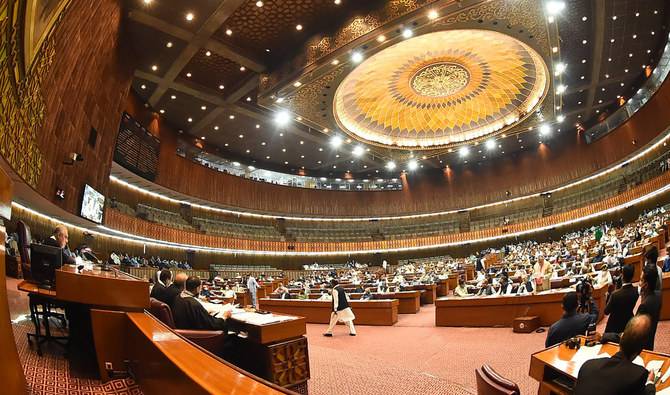
Many experts, writing on the subject or appearing in TV talk shows, have asked the PDM government to hold early elections and leave the matter of setting a budget for next fiscal year to the future elected government, which will have a mandate of five years. Every year, the budget, along with tax proposals in the form of a Finance Bill, is presented in the first week, or at the latest, by second week of June.
The present government is also set to dissolve on August 12, 2023 and a caretaker government as per Article 224 of the Constitution, is to take over for holding elections within 60 days “immediately following the day on which the term of the Assembly is due to expire, unless the Assembly has been sooner dissolved.”
The present government would lack the electoral mandate for the period from July 1, 2023 to June 30, 2024 for which it is hellbent to present budget, and tax proposals through Finance Bill 2023. Such a situation also occurred on April 27, 2018, when the then government of Pakistan Muslim League (Nawaz), with its tenure ending on May 31, 2018, intended to announce its sixth budget amidst strict criticism that the same should be left for the new elected government. The intention to release a budget at the tail end of its five-year tenure was questioned by Dr. Waqar Masood, former Adviser to Prime Minister on Finance & Revenue and ex-Federal Secretary of Finance, in an op-ed,
It is, therefore, not a question of whether the government is capable of passing the budget, but of whether it should make a budget that will not reflect the priorities and programme of the next government–the actual user. Therefore, we ask the following questions: (a) is it incumbent on the government to present a budget that it wouldn’t be making use of; (b) would there be a constitutional vacuum when an approved budget is not put in place during the period of an interim government; and (c) what is the desirable course of action for the government?
An annual budget, as aptly opined by Dr. Waqar, “contains estimates of receipts and expenditures, with a break-down between charged and voted expenditures; a detailed demand for grants voted for by the Assembly under Article 82; and a schedule of authenticated expenditures under Article 83 that are signed by the prime minister and laid out in the assembly.” The National Assembly also passes the Finance Bill (Money Bill) under Article 73 that presents tax proposals.
If the PDM passes its second budget in June this year, all the approved expenditures will take effect from July 1, 2023, 48 days after National Assembly would stand dissolved. For such a situation, the framers of Constitution provided a solution in Article 86 of the Constitution that reads as under:
“Notwithstanding anything contained in the foregoing provisions relating to financial matters, at any time when the National Assembly stands dissolved, the Federal Government may authorize expenditure from the Federal Consolidated Fund in respect of the estimated expenditure for a period not exceeding four months in any financial year, pending completion of the procedure prescribed in Article 82 for the voting of grants and the authentication of the schedule of authorized expenditure in accordance with the provisions of Article 83 in relation to the expenditure”.
The Supreme Court of Pakistan in Reference No. 1 of 1988 sent by President of Pakistan under Article 186 of the Constitution held [PLD 1989 SC 75]:
“Article 86 empowers Federal Government in a given situation to authorise expenditure from Federal Consolidated Fund for a period not exceeding four months. This is a Constitutional entrustment of legislative function on terms to the Federal Government and this is an exception to what is provided in Article 83(3)”.
In terms of Article 86 of the Constitution, the caretaker government after the dissolution of the present National Assembly completing its five-year tenure, will be bound to hold elections by October 17, 2023. The caretaker government would be empowered to authorise expenditures for 60 days.
The government of PDM in terms of Article 77 of the Constitution should not prepare tax proposals for the period running from July 1, 2023 to June 2024, for which it would lack the approval and mandate of voters, on the touchstone of the well-established principle that there ought to be no taxation without representation.
The newly-elected National Assembly for the period 2023-2028 alone would have mandate under Article 77 of the Constitution to prepare Finance Bill 2023 and prepare and take short-term and long-term fiscal measures. The PDM government would have no such mandate. Despite this clear constitutional perspective, many so-called experts are advising otherwise. Many leaders of the political parties, part of PDM alliance, have started claiming that budget 2023-24 “will bring relief for the masses”.
Needless to say, introducing a populist budget in June 2023, in the middle of an election year, that avoids the tough decisions needed to overcome grim economic challenges would be a clear violation of parliamentary norms and would even amount to pre-poll rigging.
It is now well-established that our legislators, no matter which party they belong to, have no will to resist the urge to turn to unconstitutional actions, even though they have taken oaths to safeguard the supremacy of the Constitution and discharge all functions within strict parameters laid down in the supreme law of the land. There is a perpetual failure on this count and thus no wonder that we lack sustainable democracy and responsible governments that can protect the rights of masses guaranteed in the Constitution.
The legislature may be sovereign but the supremacy of Constitution towers over everything else - legislators in fact exercise delegated powers derived from the citizenry within the framework of the Constitution. By violating the commands of the Constitution, our elected representatives are guilty of betraying the people of Pakistan.

